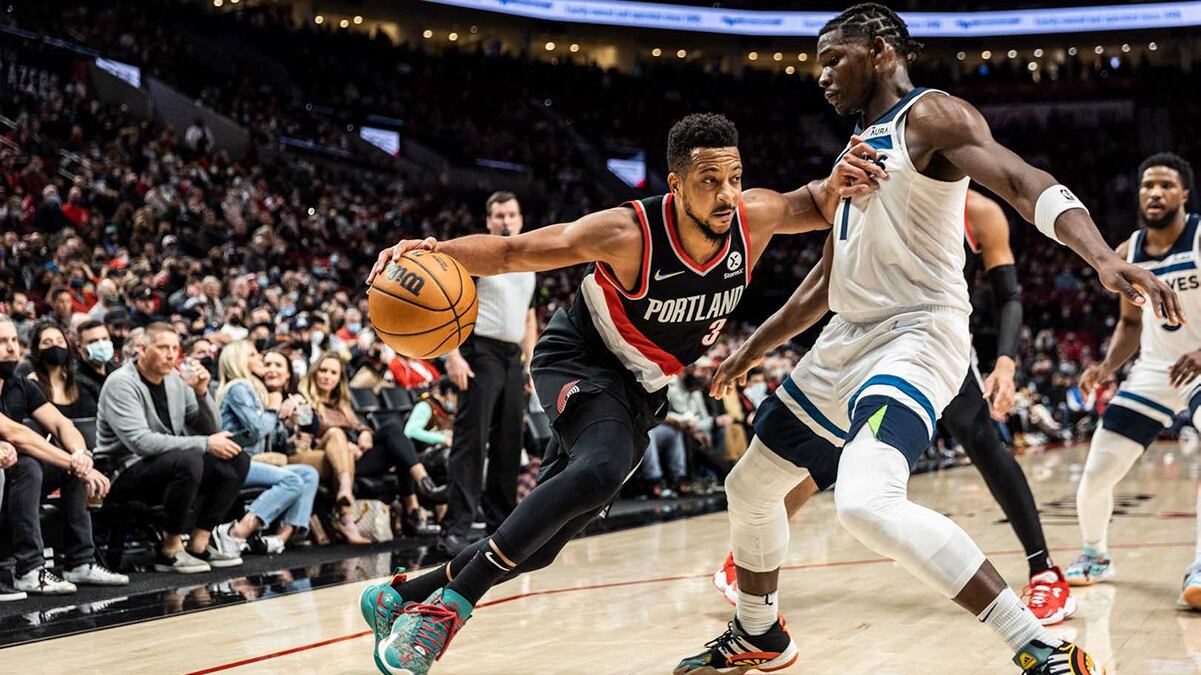It’s time to stop spending money on the Portland Trail Blazers.
After literally years of doubling down on the same sunk cost—CJ McCollum starting alongside Damian Lillard—the Blazers have finally admitted their interminable experiment was a bust. Turns out it’s kinda hard to compete for an NBA championship with two score-first, defend-never, 6-foot-3 guards as your top players. Not even Carmelo Anthony can fix that lineup.
Here’s the catch: The Blazers front office, led by newly promoted general manager Joe Cronin, is literally giving players away to divest from the McLillard era.
In the past week, the Blazers have traded away McCollum, Norman Powell, Robert Covington and Larry Nance. Those four players range from solid to nearly all-stars, and all but McCollum are on decent contracts, so it’s reasonable to assume Cronin made out quite well in the deals. The Blazers should be greedily counting their draft picks and blue-chip prospects like a retired grandma at an off-the-strip slot machine.
So what was the haul for those four players?
Josh Hart, the Pelicans’ 2022 first-round draft pick (as long as it falls in the 5-14 range), a couple second-round draft picks, and a bunch of guys you’ve never heard of before. A rather tepid jackpot, to say the least. Hart is a fine player who hopefully sticks with the Blazers, but it’s a tough sell to say that one decent player, one draft pick, and a bunch of de facto scratch-off tickets are a fair return for four starting-caliber players.
Perhaps most galling was the Powell trade. The Blazers shipped Powell and Covington to the Clippers and couldn’t even talk L.A. into sending back a first-round pick. An unforgivable return on investment after the Blazers surrendered Gary Trent Jr. and two first-round draft picks of their own for those two players last season. Naturally, Powell immediately dropped 28 points against the Bucks, the reigning NBA champs, in his first game as a Clipper.
Cronin and the front office will jump in now to point out that one of those guys you’ve never heard of before, Keon Johnson, was a first-round draft pick just a few months ago and that Eric Bledsoe’s partially guaranteed contract, the primary salary ballast in the deal, could be a useful trade asset. That narrative, however, is overly optimistic at best.
As a general rule, it’s a very bad sign when an NBA team trades its own first-round pick mere months after the draft. Teams aren’t willing to give up on “their guy” and a cheap, rookie-scale contract unless things have gone completely sideways. Unfortunately, Johnson’s far more likely to be the next Wade Baldwin than the next Chauncey Billups. Similarly, Bledsoe’s partially guaranteed eight-figure contract is only useful as a trade chip before the trade deadline on Thursday. After that, only $3.9 million can be used in a trade.
So what did the Blazers gain by making these trades? Lots and lots of money. A week ago they were $3 million into the NBA’s luxury tax—now they’re more than $17 million under the cap. Going forward, McCollum and Powell were due more than $140 million over the next several seasons. More than anything, the Blazers cut a lot of salary this week.
Unfortunately, it’s unclear if that reduced salary will translate to an improved on-court product. Even after all those trades, the Blazers will still need to cut Hart and release Jusuf Nurkic to create about $30 million in cap space. If they keep either of those players, the cap space falls to less than $20 million. Not exactly enough to bring James Harden to the Rose City.
Surely McCollum and his onerous contract needed to be traded—Hart plus a protected first rounder is a solid return—but if the Blazers aren’t going to be major players on the free agent market it’s unclear why they didn’t just hang on to Powell and Nance until this offseason to search for more favorable trades. The moves reek of change for change’s sake rather than a carefully considered reconstruction of the roster.
In the end, team governor Jody Allen is the one who walks away with a clear net gain from these trades. The billionaire, several times over, stands to save many millions in team payroll while the rest of us fantasize about how a $21 million trade exception might set the Blazers up to somehow absorb Ben Simmons’ $34 million contract this summer.
In the meantime, season ticket holders, who laid out their own money while the team was claiming to be in win-now mode, will be treated to a starting lineup featuring CJ Elleby or Ben McLemore instead of Powell or Nance.
Until the Blazers demonstrate they’re actually going to spend money to replace the outgoing players, proving these trades are more than cost-cutting maneuvers, it’s hard to understand why they expect fans to continue spending money on the team.
